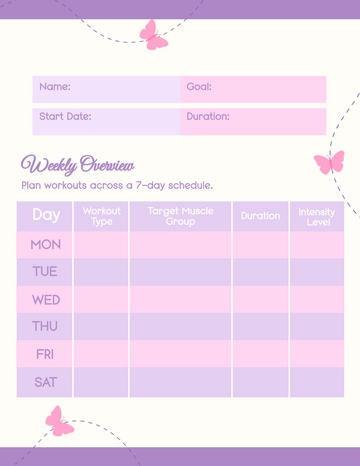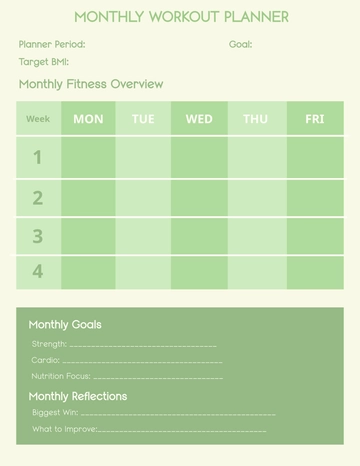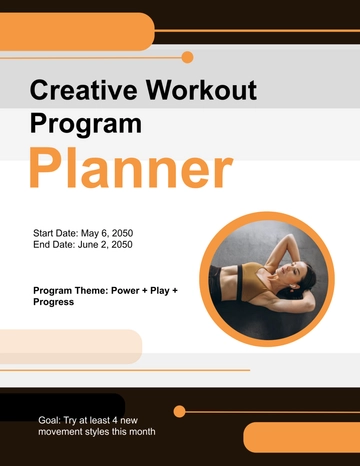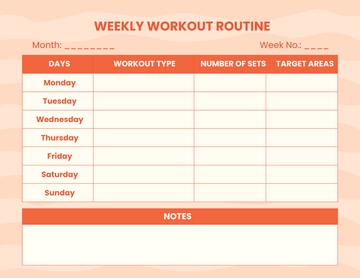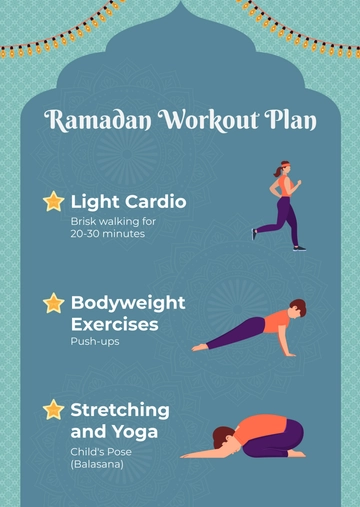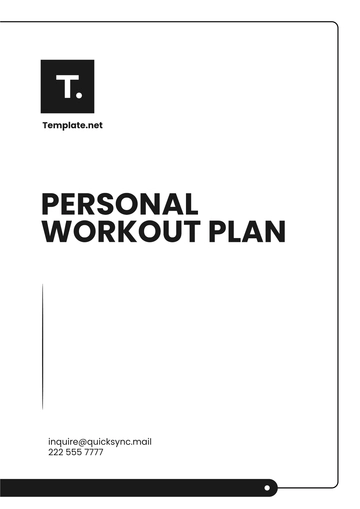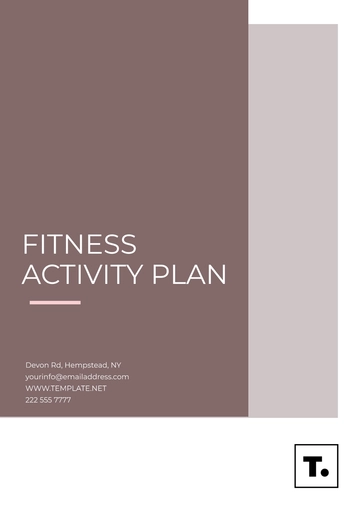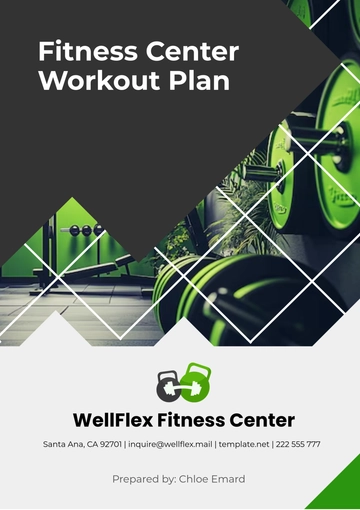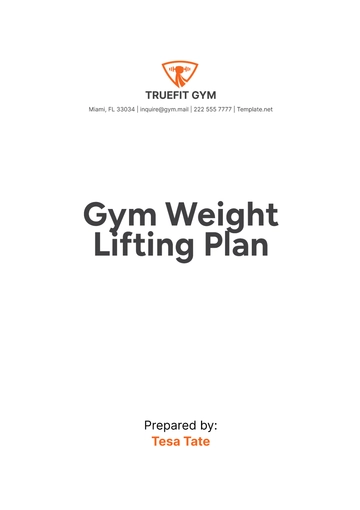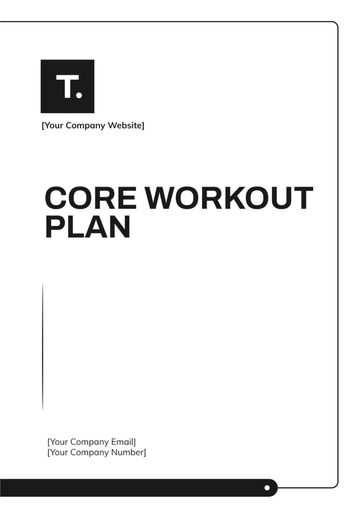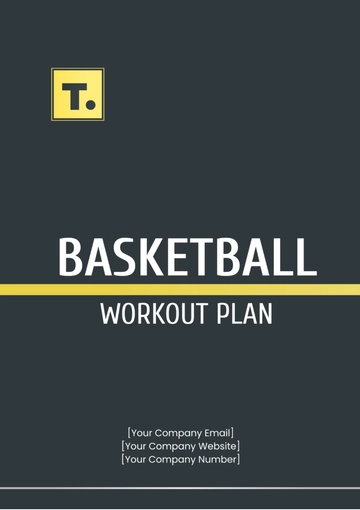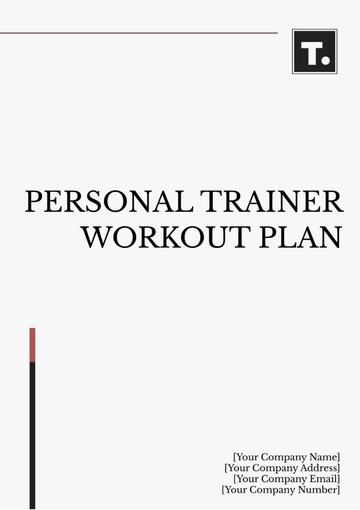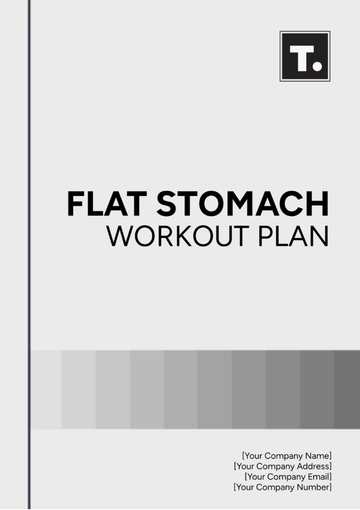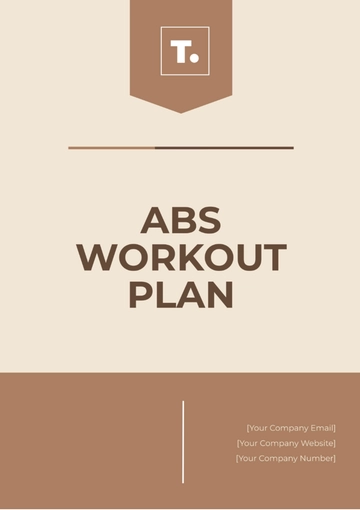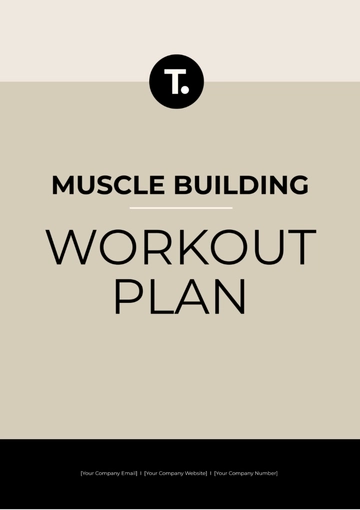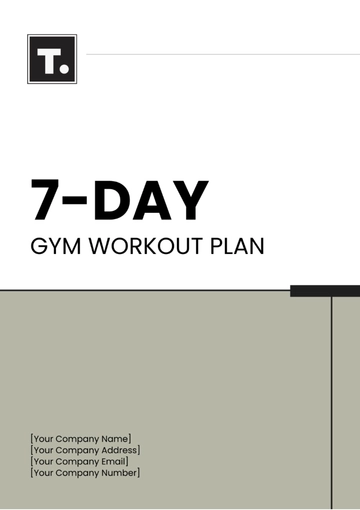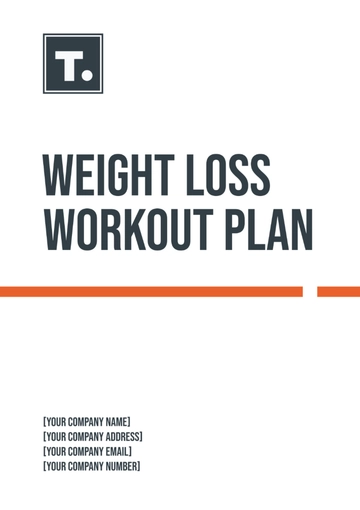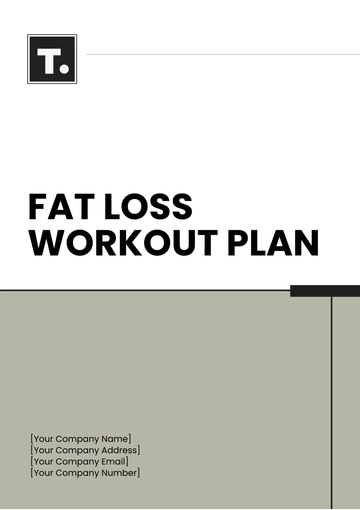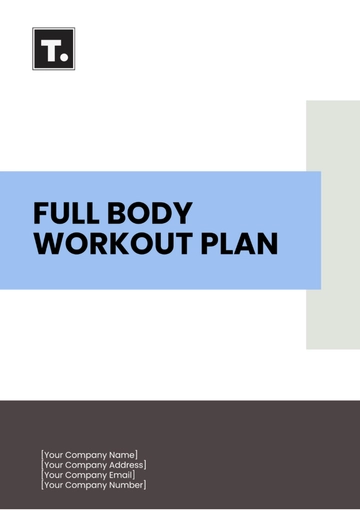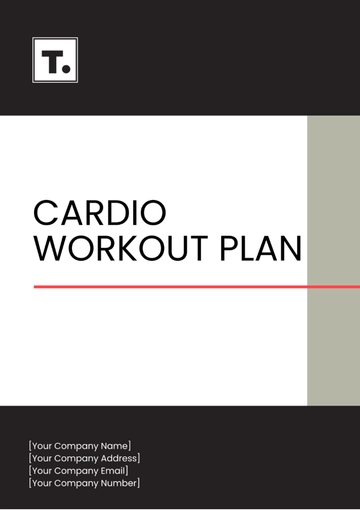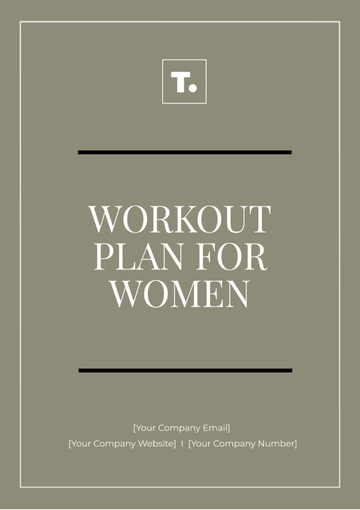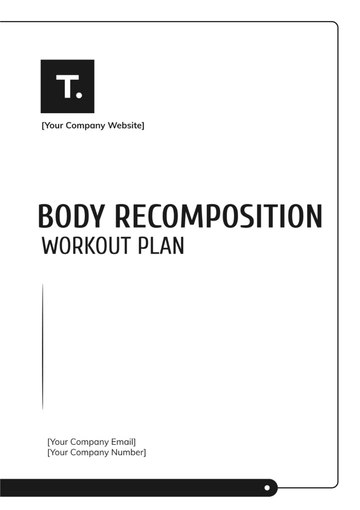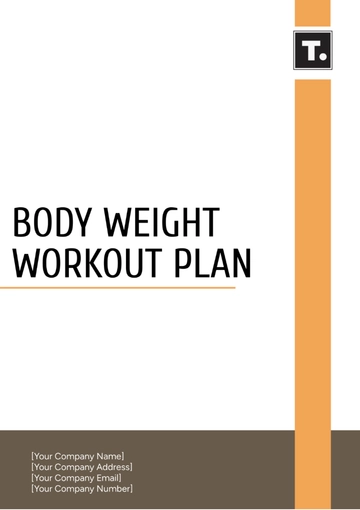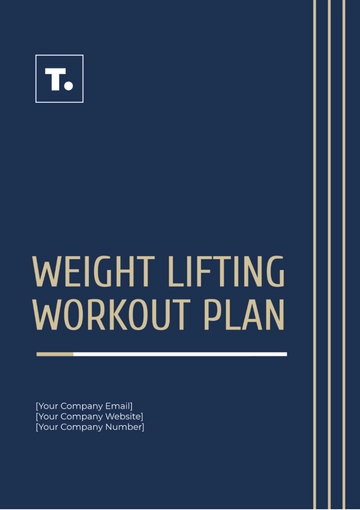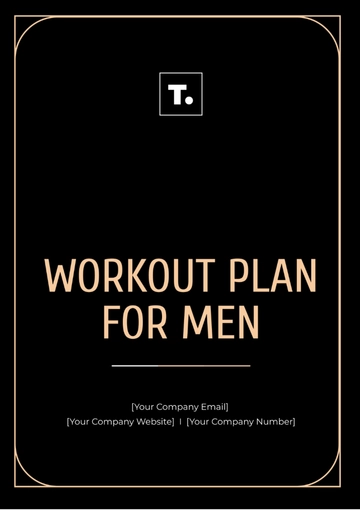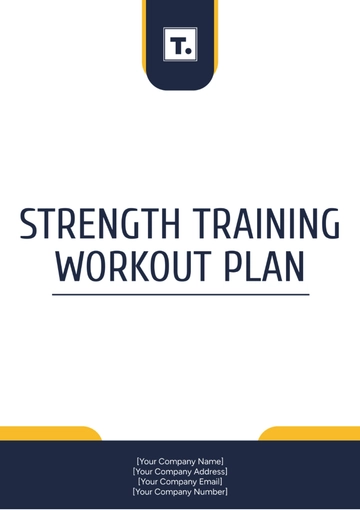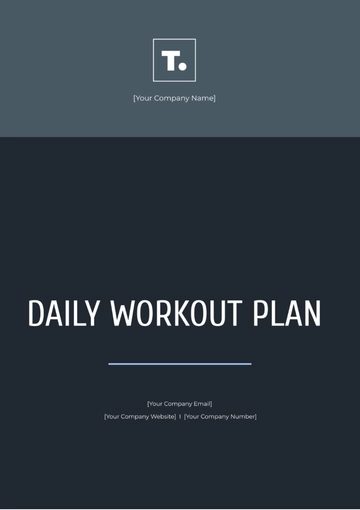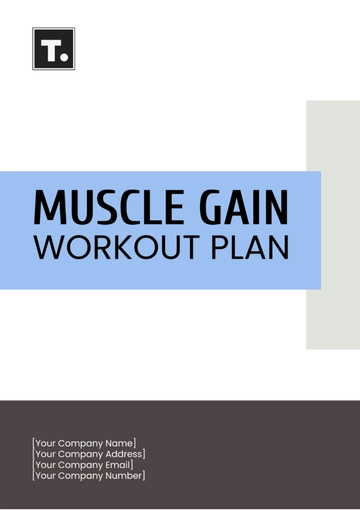Free Fitness Center Workout Plan
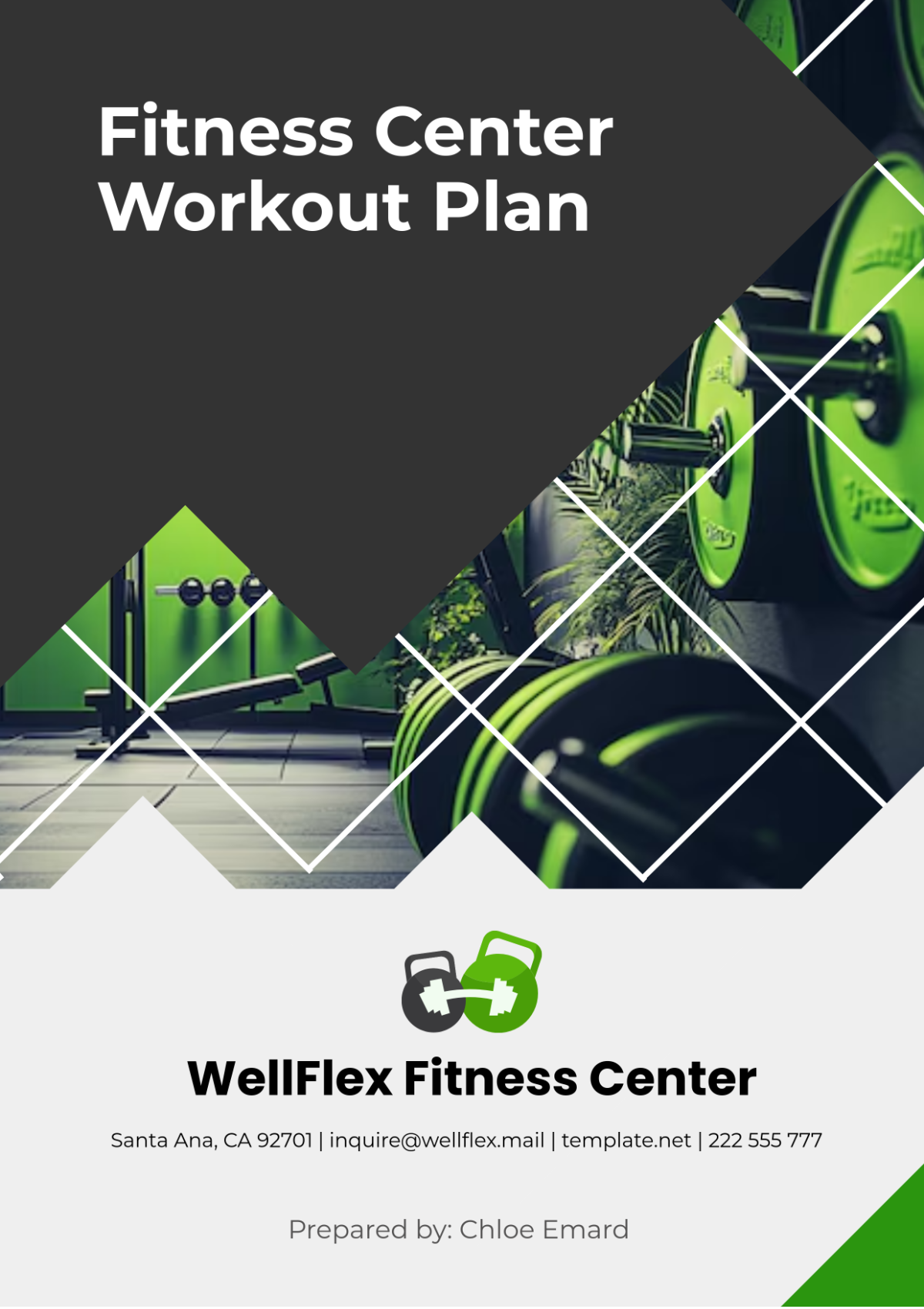
1. Introduction
Welcome to [Your Company Name]'s exclusive Fitness Center Workout Plan, designed for the year [2050] and beyond! As our understanding of fitness, nutrition, and well-being continues to evolve, this comprehensive plan aims to provide a holistic approach to achieving your fitness goals. With an emphasis on balanced physical conditioning, we target not just strength and endurance but also flexibility and cardiovascular health.
Whether you’re a beginner exploring your fitness journey or an advanced athlete looking to refine your skills, this plan offers structured guidance tailored to meet diverse fitness levels and preferences. The cornerstone of our approach is the integration of science-backed routines that incorporate the latest advancements in fitness technology and nutrition. We aim to create an engaging and supportive environment where members feel motivated and empowered to reach their full potential.
Our plan is further enhanced by the inclusion of adaptive scheduling and pricing options that cater to various needs, ensuring accessibility and engagement for everyone, regardless of their starting point. In this document, you will find detailed sections outlining our workout plan, pricing structures, safety protocols, nutritional guidance, and tools for monitoring progress.
2. Workout Plan Overview
Our workout plan is meticulously categorized into different tiers based on fitness goals, ensuring that every member finds the right fit for their unique needs. These tiers are designed to focus on varying intensities and exercise types, allowing for adaptability as individuals progress in their fitness journeys.
2.1 Tier Structure
Tier 1: Beginner Focus – This tier is aimed at building a solid foundation in strength and endurance, with a strong emphasis on learning proper form and technique.
Tier 2: Intermediate Conditioning – Targeted at those who have developed a basic level of fitness, this tier increases intensity and introduces more complex exercises to challenge participants and improve cardiovascular and muscular endurance.
Tier 3: Advanced Training – Focuses on high-intensity workouts that promote muscular hypertrophy, endurance, and overall athletic performance. This tier is designed for seasoned athletes looking to push their limits.
Below is a detailed weekly breakdown of the workout plan, featuring the recommended time and intensity for each day. This structure is designed to maximize recovery while ensuring consistent progress.
Day of the Week | Tier 1 (Beginner) | Tier 2 (Intermediate) | Tier 3 (Advanced) |
|---|---|---|---|
Monday | Full Body Strength | Upper Body Strength | Full Body HIIT |
Tuesday | Cardio & Flexibility | Lower Body Strength | Cardio Endurance |
Wednesday | Rest Day | Active Rest | Core Strength |
Thursday | Lower Body Strength | Core & Flexibility | Lower Body Plyometrics |
Friday | Upper Body Circuit | Cardio & Endurance | Upper Body Power |
Saturday | Cardio Circuit | Strength Conditioning | Lower Body HIIT |
Sunday | Rest Day | Rest Day | Rest Day |
Each tier's activities are designed to be scalable, allowing individuals to adjust the number of repetitions, sets, and weight used based on their personal fitness level. Furthermore, our trainers are available to provide personalized assessments to help tailor workouts to individual needs and goals.
3. Workout Breakdown
3.1 Strength Training
Strength training is a fundamental aspect of physical health, offering numerous benefits such as increased metabolism, enhanced joint function, improved muscle tone, and greater overall strength. Each exercise within this section focuses on specific muscle groups, with a focus on progressive overload to ensure long-term results.
3.1.1 Upper Body Strength
Upper body strength training is essential for building a balanced physique. It improves daily functional movements, increases muscle mass, and enhances overall upper body strength. Below is a detailed table listing exercises suitable for all tiers, focusing on building strength in major upper body muscle groups.
Exercise | Reps (Tier 1) | Reps (Tier 2) | Reps (Tier 3) | Equipment |
|---|---|---|---|---|
Chest Press | [10-12] | [12-15] | [15-20] | Dumbbells |
Lat Pulldown | [10-12] | [12-15] | [15-20] | Pulley Machine |
Bicep Curls | [8-10] | [10-12] | [12-15] | Dumbbells |
Tricep Extensions | [8-10] | [10-12] | [12-15] | Cable Machine |
Shoulder Press | [10-12] | [12-15] | [15-20] | Dumbbells |
This table provides a structured approach to upper body workouts. For instance, beginners in Tier 1 can start with lighter weights to master form, gradually increasing the weight and intensity as they progress to Tier 2 and Tier 3.
3.1.2 Lower Body Strength
Lower body strength is crucial not only for aesthetics but also for improved performance in sports and daily activities. Strong legs contribute to overall stability and balance, making lower body training an essential component of any fitness regimen.
Exercise | Reps (Tier 1) | Reps (Tier 2) | Reps (Tier 3) | Equipment |
|---|---|---|---|---|
Squats | [10-12] | [12-15] | [15-20] | Barbell |
Deadlifts | [8-10] | [10-12] | [12-15] | Barbell |
Lunges | [10-12] | [12-15] | [15-20] | Dumbbells |
Leg Press | [10-12] | [12-15] | [15-20] | Machine |
Calf Raises | [12-15] | [15-20] | [20-25] | Machine/Dumbbell |
As shown in the table, exercises like squats and deadlifts engage multiple muscle groups, providing comprehensive lower body strength development. Members are encouraged to focus on form, gradually increasing weights to build strength and endurance effectively.
3.2 Cardiovascular Conditioning
Cardiovascular health is a vital component of fitness, contributing to weight management, improved mood, and reduced risk of chronic disease. Engaging in regular cardiovascular exercise enhances stamina, boosts energy levels, and promotes heart health.
3.2.1 Aerobic Exercise
Aerobic exercise forms the foundation of cardiovascular conditioning. These activities elevate heart rate, improve lung capacity, and enhance overall stamina. Below is a structured table outlining various aerobic exercises suited for each tier.
Activity | Duration (Tier 1) | Duration (Tier 2) | Duration (Tier 3) | Frequency |
|---|---|---|---|---|
Treadmill | [20 mins] | [30 mins] | [45 mins] | [3 times/week] |
Stationary Bike | [15 mins] | [25 mins] | [40 mins] | [2 times/week] |
Rowing Machine | [10 mins] | [20 mins] | [30 mins] | [3 times/week] |
For instance, Tier 1 members can begin with [20] minutes of walking on the treadmill, gradually transitioning to jogging and running as they progress to Tier 2 and Tier 3. Consistent aerobic training builds endurance and improves heart function, crucial for overall fitness.
3.2.2 High-Intensity Interval Training (HIIT)
High-Intensity Interval Training (HIIT) is a popular training method known for its efficiency in burning calories and improving cardiovascular fitness in a short amount of time. The following table outlines HIIT exercises tailored for each fitness tier.
Exercise | Sets (Tier 1) | Sets (Tier 2) | Sets (Tier 3) | Interval Timing |
|---|---|---|---|---|
Burpees | [2] | [3] | [4] | [30s on/15s rest] |
Jump Squats | [2] | [3] | [4] | [30s on/15s rest] |
Mountain Climbers | [2] | [3] | [4] | [30s on/15s rest] |
Sprints | [2] | [3] | [4] | [45s on/15s rest] |
HIIT workouts offer a time-efficient way to elevate heart rates and boost metabolism. Members can adjust the number of sets and intervals according to their fitness level, ensuring a challenging yet achievable workout.
3.3 Flexibility & Mobility Training
Flexibility training enhances the body’s range of motion, reducing the risk of injury and promoting better posture. This section outlines the importance of incorporating flexibility and mobility routines into the overall workout plan.
3.3.1 Dynamic Stretching (Pre-Workout)
Dynamic stretching prepares the body for exercise by warming up the muscles and increasing blood flow. Below is a table detailing effective dynamic stretches to be performed before workouts.
Stretch | Duration (Tier 1) | Duration (Tier 2) | Duration (Tier 3) |
|---|---|---|---|
Arm Circles | [1 min] | [1 min] | [1 min] |
Leg Swings | [1 min] | [1 min] | [1 min] |
Walking Lunges | [1 min] | [1 min] | [1 min] |
Hip Circles | [1 min] | [1 min] | [1 min] |
By performing these dynamic stretches, members activate their muscles, preparing them for the workout ahead. This practice is crucial for optimizing performance and minimizing injury risk.
3.3.2 Static Stretching (Post-Workout)
Static stretching is vital for cool-down routines, promoting flexibility and aiding muscle recovery. Below is a table of recommended static stretches to be included in post-workout cool-down sessions.
Stretch | Duration (Tier 1) | Duration (Tier 2) | Duration (Tier 3) |
|---|---|---|---|
Chest Stretch | [30s] | [30s] | [30s] |
Hamstring Stretch | [30s] | [30s] | [30s] |
Quadriceps Stretch | [30s] | [30s] | [30s] |
Tricep Stretch | [30s] | [30s] | [30s] |
Incorporating these stretches post-workout helps reduce muscle soreness, enhances flexibility, and promotes relaxation, allowing the body to recover effectively after each training session.
4. Monitoring Progress
Tracking progress is essential for maintaining motivation and accountability in any fitness journey. At [Your Company Name], we provide a comprehensive system for members to monitor their workouts, nutrition, and overall health.
4.1 Fitness Assessment
Regular fitness assessments are a vital component of our monitoring process. These assessments allow us to evaluate members’ starting points and track progress over time.
Assessment Type | Frequency | Parameters Measured |
|---|---|---|
Initial Assessment | At Enrollment | Body Composition, Strength Levels |
Monthly Review | Every Month | Cardio Endurance, Strength Progression |
Quarterly Evaluation | Every Three Months | Flexibility, Weight Changes |
4.2 Goal Setting
Setting realistic and achievable goals is crucial for fostering motivation and ensuring members stay engaged in their fitness journey. The SMART criteria (Specific, Measurable, Achievable, Relevant, Time-bound) will be utilized in the goal-setting process.
Goal Type | Description | Example |
|---|---|---|
Performance Goals | Focus on improving specific fitness metrics | "Increase deadlift weight by [20 lbs] in [3 months]" |
Aesthetic Goals | Target visual changes in body composition | "Reduce body fat percentage by [5%] in [6 months]" |
Health Goals | Aim for improved health markers | "Lower resting heart rate to [60 bpm] in [4 months]" |
Members will work closely with trainers to create personalized goal-setting plans, ensuring that their objectives align with their fitness aspirations and timelines.
5. Pricing Structure
Understanding the financial aspect of joining [Your Company Name] is essential for prospective members. Our transparent pricing structure is designed to accommodate various budgets while ensuring access to high-quality facilities and expert guidance.
5.1 Membership Options
We offer a variety of membership tiers to suit diverse needs. Below is a table summarizing the options available for our members.
Membership Type | Duration | Monthly Fee | Access Level |
|---|---|---|---|
Basic | [1 month] | $[30] | Access to gym equipment |
Standard | [6 months] | $[25] | Basic + Group Classes |
Premium | [1 year] | $[20] | Standard + Personal Training |
Members can choose the plan that best fits their lifestyle and fitness goals, ensuring that they receive the most value for their investment.
5.2 Add-On Services
To further enhance the member experience, we offer additional services that can be added to any membership plan. These services include:
Add-On Service | Fee | Description |
|---|---|---|
Personal Training | $[50/session] | One-on-one training tailored to individual needs |
Nutrition Counseling | $[40/session] | Guidance on meal planning and nutritional habits |
Group Classes | $[15/class] | Engaging classes focusing on various fitness modalities |
These add-ons are designed to provide members with personalized support and guidance, ensuring they receive a well-rounded fitness experience.
6. Safety and Injury Prevention
Safety is of utmost importance at [Your Company Name]. Our aim is to foster a culture that prioritizes injury prevention while promoting effective training methods. This section outlines essential safety protocols, including warm-up and cool-down routines.
6.1 Warm-Up and Cool-Down Protocols
Proper warm-up and cool-down procedures are vital for preparing the body for exercise and promoting recovery afterward. Below is a table that outlines recommended warm-up and cool-down protocols.
Protocol | Exercise Example | Duration |
|---|---|---|
Warm-Up | Jogging, Dynamic Stretches | [10 mins] |
Cool-Down | Static Stretches, Deep Breathing | [10 mins] |
During the warm-up, members are encouraged to engage in light aerobic activities that gradually increase their heart rates and prepare their muscles for exertion. The cool-down phase is equally important, as it facilitates recovery and helps prevent muscle tightness.
6.2 Injury Prevention Guidelines
To promote a safe workout environment, the following guidelines are crucial for reducing the risk of injury:
Safety Tips | Description |
|---|---|
Form and Technique | Proper form and technique are critical. Members are encouraged to seek guidance from trainers if they are unsure. |
Gradual Progression | Increasing weights or intensity should be done gradually to avoid strains and injuries. Members should focus on incremental changes. |
Rest and Recovery | Adequate rest is essential for recovery. Members should allocate at least [48 hours] of rest between workouts targeting the same muscle groups. |
Proper Hydration | Staying hydrated is key to performance and recovery. Members are encouraged to drink water before, during, and after workouts. |
By adhering to these guidelines, members can enhance their workout experience while minimizing the risk of injury.
7. Nutrition and Supplementation
Nutrition plays a critical role in achieving fitness goals. At [Your Company Name], we emphasize the importance of balanced nutrition, providing guidance on pre-workout and post-workout meals as well as supplement recommendations.
7.1 Pre-Workout Nutrition
Proper pre-workout nutrition fuels the body for exercise and helps optimize performance. Below is a detailed table outlining recommended nutrients, foods, and quantities to consume before workouts.
Nutrient | Recommended Foods | Quantity |
|---|---|---|
Carbohydrates | Oatmeal, Bananas, Whole Grains | [30g] |
Protein | Greek Yogurt, Eggs | [15g] |
Healthy Fats | Avocado, Almonds | [5g] |
A balanced pre-workout meal enhances energy levels, ensuring members feel energized and ready to tackle their workouts. It is advisable to consume this meal about [30-60 minutes] before exercising.
7.2 Post-Workout Nutrition
Post-workout nutrition is crucial for recovery and muscle growth. Consuming the right nutrients helps replenish energy stores and repair muscle tissue. Below is a detailed table outlining recommended post-workout nutrition.
Nutrient | Recommended Foods | Quantity |
|---|---|---|
Protein | Whey Protein Shake, Chicken | [25g] |
Carbohydrates | Sweet Potatoes, Quinoa | [40g] |
Electrolytes | Coconut Water, Sports Drink | [1 cup] |
A well-rounded post-workout meal aids in recovery, reduces muscle soreness, and prepares the body for future training sessions. Members are encouraged to consume their post-workout meal within [30 minutes] after exercising.
7.3 Supplement Guidance
While whole foods should always be the foundation of nutrition, supplements can play a role in optimizing performance and recovery. Below is a summary of recommended supplements that may benefit members.
Supplement | Benefits | Recommended Dosage |
|---|---|---|
Protein Powder | Aids in muscle recovery and growth | [20-30g] post-workout |
Creatine | Enhances strength and power output | [5g] daily |
Multivitamins | Supports overall health and wellness | [1 tablet] daily |
Omega-3 Fatty Acids | Reduces inflammation and supports heart health | [1000mg] daily |
Members are advised to consult with nutritionists before incorporating supplements into their diets to ensure they meet individual health needs and fitness goals.
8. Conclusion
By following [Your Company Name]'s Comprehensive Fitness Center Workout Plan for 2050 and beyond, members can expect structured guidance, measurable progress, and ongoing support from our expert team. This plan is designed for longevity, promoting sustainable health and fitness for years to come.
As the fitness landscape continues to evolve, [Your Company Name] remains committed to providing cutting-edge programs and resources to empower individuals on their wellness journeys. Together, we can achieve great things, one workout at a time. Members are encouraged to embrace this journey, take pride in their progress, and foster a positive community of health and fitness enthusiasts.
By implementing this comprehensive plan, we hope to inspire members to make fitness a lifelong pursuit, equipped with the tools, knowledge, and support necessary to thrive in their health and wellness endeavors. Let’s embark on this exciting journey together!
- 100% Customizable, free editor
- Access 1 Million+ Templates, photo’s & graphics
- Download or share as a template
- Click and replace photos, graphics, text, backgrounds
- Resize, crop, AI write & more
- Access advanced editor
Organize workout routines with the Fitness Center Workout Plan Template from Template.net. This editable and customizable template allows trainers to design fitness programs that align with client goals. Customize it using our Ai Editor Tool for personalized, effective workout plans.
You may also like
- Finance Plan
- Construction Plan
- Sales Plan
- Development Plan
- Career Plan
- Budget Plan
- HR Plan
- Education Plan
- Transition Plan
- Work Plan
- Training Plan
- Communication Plan
- Operation Plan
- Health And Safety Plan
- Strategy Plan
- Professional Development Plan
- Advertising Plan
- Risk Management Plan
- Restaurant Plan
- School Plan
- Nursing Home Patient Care Plan
- Nursing Care Plan
- Plan Event
- Startup Plan
- Social Media Plan
- Staffing Plan
- Annual Plan
- Content Plan
- Payment Plan
- Implementation Plan
- Hotel Plan
- Workout Plan
- Accounting Plan
- Campaign Plan
- Essay Plan
- 30 60 90 Day Plan
- Research Plan
- Recruitment Plan
- 90 Day Plan
- Quarterly Plan
- Emergency Plan
- 5 Year Plan
- Gym Plan
- Personal Plan
- IT and Software Plan
- Treatment Plan
- Real Estate Plan
- Law Firm Plan
- Healthcare Plan
- Improvement Plan
- Media Plan
- 5 Year Business Plan
- Learning Plan
- Marketing Campaign Plan
- Travel Agency Plan
- Cleaning Services Plan
- Interior Design Plan
- Performance Plan
- PR Plan
- Birth Plan
- Life Plan
- SEO Plan
- Disaster Recovery Plan
- Continuity Plan
- Launch Plan
- Legal Plan
- Behavior Plan
- Performance Improvement Plan
- Salon Plan
- Security Plan
- Security Management Plan
- Employee Development Plan
- Quality Plan
- Service Improvement Plan
- Growth Plan
- Incident Response Plan
- Basketball Plan
- Emergency Action Plan
- Product Launch Plan
- Spa Plan
- Employee Training Plan
- Data Analysis Plan
- Employee Action Plan
- Territory Plan
- Audit Plan
- Classroom Plan
- Activity Plan
- Parenting Plan
- Care Plan
- Project Execution Plan
- Exercise Plan
- Internship Plan
- Software Development Plan
- Continuous Improvement Plan
- Leave Plan
- 90 Day Sales Plan
- Advertising Agency Plan
- Employee Transition Plan
- Smart Action Plan
- Workplace Safety Plan
- Behavior Change Plan
- Contingency Plan
- Continuity of Operations Plan
- Health Plan
- Quality Control Plan
- Self Plan
- Sports Development Plan
- Change Management Plan
- Ecommerce Plan
- Personal Financial Plan
- Process Improvement Plan
- 30-60-90 Day Sales Plan
- Crisis Management Plan
- Engagement Plan
- Execution Plan
- Pandemic Plan
- Quality Assurance Plan
- Service Continuity Plan
- Agile Project Plan
- Fundraising Plan
- Job Transition Plan
- Asset Maintenance Plan
- Maintenance Plan
- Software Test Plan
- Staff Training and Development Plan
- 3 Year Plan
- Brand Activation Plan
- Release Plan
- Resource Plan
- Risk Mitigation Plan
- Teacher Plan
- 30 60 90 Day Plan for New Manager
- Food Safety Plan
- Food Truck Plan
- Hiring Plan
- Quality Management Plan
- Wellness Plan
- Behavior Intervention Plan
- Bonus Plan
- Investment Plan
- Maternity Leave Plan
- Pandemic Response Plan
- Succession Planning
- Coaching Plan
- Configuration Management Plan
- Remote Work Plan
- Self Care Plan
- Teaching Plan
- 100-Day Plan
- HACCP Plan
- Student Plan
- Sustainability Plan
- 30 60 90 Day Plan for Interview
- Access Plan
- Site Specific Safety Plan
